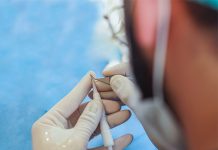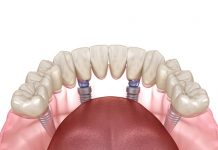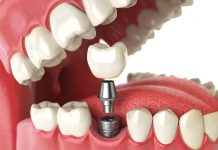Dental Implantation
Dental Implantation in Turkey, its average cost, dental implant methods, and everything you need to know about teeth replacement procedures are explained.
Dental Implantation procedures are getting popular day by day as well as showing advancements in application thanks to new techniques and technologies. Those implants and the problems they solve cost between £550 to €11,500; therefore, patients get the highest quality implants for a much cheaper price. Having different methods such as All-on-4, All-on-6, or All-on-8, dental implantation surgeries are more problem-focused and easier now.
Dental health is an important aspect affecting our life quality as much as our overall health. When you experience problems regarding your teeth, gums, or mouth, you might also experience several problems connected to these issues with your dental health. For instance, if you have serious decaying teeth and toothache, this may wake you up from your sleep at night; give you endless headaches or even migraines, put you in an irritable or in miserable mood.
On the other hand, having teeth that are not pleasing to the eyes might crush your self-esteem and confidence to the ground. In severe and prolonged cases, your insecurities can create gigantic anxiety. This situation might even lead to mental issues such as general anxiety disorder, social phobia, or social anxiety. It is certain that these mental issues will add up to your dental problems and alter your life quality in a tremendously negative way.
If you are experiencing dental problems, it is recommended that you consult a professional to solve your issue. Carrying this out abroad is more wallet-friendly and you will lose nothing in terms of the quality of the service you receive. That is why countries like Turkey are preferred over other ones or one’s homeland in the first place. It might even cost less with ticket and accommodation fees. Within the light of this article, you can acquire detailed insights about the pros, cons, types and the conducting of dental implants.
Definition of Dental Implants and the Cases They Are Used in
Dental implants are basically little screws placed in your gums to replicate your missing teeth roots. They are usually made of substances like titanium. The main reason behind why they are mode of titanium is rooted in this metal’s properties. Titanium is a kind of metallic element which is widely known to be blend perfectly in with the natural bone structure of human beings. It is also used in knee or hip replacements and that is the exact reason behind it.
This metallic element is highly resistant to corrosion as well as being ultimately strong. When the dental implantation starts to blend in with its environment, this process is named “Osseointegration”. This period generally lasts for two or three months. At the very end, the jaw bone and the titanium implant fuse together. After they are produced personally for the patient’s unique mouth structure, they are drilled into the jaw bone. They can provide support for a crown, bridge, or denture. Of course, it takes a little bit of time to prepare those implants. It is very important for them the fit the patient’s mouth properly and without issues. Therefore, they will not be available during your first visit to your dentist’s clinic. This means that you need to take several trips to your dentist’s until your treatment is completely done.
Thinking with basic logic, dental implants are permanent alternatives to removable dentures which have a much lesser life span. They are usually the only option left when the patient’s loss of teeth has caused their mouth to shrink or changed the outer facial appearance. This shrinking in the dentures also means that they are not able to support the dentures now. These implants can be used for replacing one, more, or a full set of missing teeth. The quantity of dental implantation your dentist needs generally changes in accordance with the overall situation of your dental structure. There are options like All on 4, All on 6, or All on 8 dental implants. The numbers here represent the exact number of implants that are to be drilled into your jaw bone. Nonetheless, the problem can be solved with just a single implant, as well.
They are artificial tooth roots; however, in the cases where a patient needs multiple or a full set of teeth to be replaced, they are used in the form of Implant Bridges that are attached to the implants themselves. The results are totally natural and comfortable for those implants are placed in the jaw bone. So there is no missing point. “Implant” as a word, directly refers to the titanium screw that is drilled into the jaw.
As mentioned above, in the cases the patient needs an implant bridge or more than that, there are also “Implant Abutments”. These are the things that connect the implants with the crown; they function as a supporter or somewhat as a bounder.
Your clinic should inform you of all those inclusive costs regarding your treatment plan. If not, you can always demand to be provided with that information.
Dental implants are also referred to as “Smile in a day” or “Teeth in a day” treatments. Even this, indeed, gives the patient a clue about the overall time in regards to their treatment. Once the implants are ready to be fitted into the jaw, the rest takes much lesser time than other options like false dental teeth.
Advantages of Dental Implantation
There are many advantages of dental implants. In a general sense, one can easily say that they will improve your life quality. Here are some of the advantages of dental implants:
Charming and improved appearance: Dental implants are designed and implanted in such a way that they will feel like your very own teeth. Since they fuse with your jaw bone, they become permanently fit to your unique face and mouth structure. Thanks to these aspects, it will look more natural and it will sophisticate your appearance in a positive way due to its harmonious application.
Improvements in the speech: Poor-shaped or poor-fitting dentures do not fit properly in your mouth and they may cause you to mumble or swallow your words. With dental implants, though, your speaking skills will hit the peak and you will be able to speak without worry or hesitation.
More comfortable: Dental implants become a permanent part of you when you receive them. Unlike the dentures/ false teeth, you will not face problems like them coming out suddenly or taking them out in a water solution every night and then sleeping the whole night without your teeth.
Comfortable eating: False dentures make chewing or, in general, eating much harder. You will not experience such issues with dental implants since they are no different from your own teeth in terms of functionality. You will be able eat your favourite foods without pain and with the enjoyable confidence and excitement.
Increased self-esteem: Your smile will get back to its shiny, pearly days. You will feel much better when you can smile and laugh without hesitation.
Beneficial for improving oral health: With dental implants, your other teeth will not be reduced in number. This is due to the fact that your nearby teeth are not changed in any way to support the implant. Your very own teeth are left intact and this improves your chances of maintaining your oral health at its best for very long years. It also improves oral hygiene because they allow access between teeth more easily.
Durability: Titanium implants are very strong and durable. They will last for many years. Right now, researches have claimed that they last 10 or more years and they are still in the controlling phase. This clearly conveys the idea that dental implants have the capacity of lasting more than 10, or maybe even 20 years. It might also be revealed later that they are actually able to last for a life time.
Dental Implantation Procedures and Dental Implant Types
Dental implants can show variance in accordance with the needs and the overall state of patients. Some patients need a full set of implants whereas some only need a single titanium screw in their jaw. Here are the most common procedures of dental implantation:
1) All on 4 Dental Implants:
Strategically correct points are chosen in patient’s mouth. Dentists use only four implants and they are able to carry the whole set. The teeth at the back are usually placed with a special angle to maintain the balance within jaw, thus carrying the bridge itself. This method saves time and the other teeth of the patient. It can be preferred to having full dentures/ fake teeth and it is much less painful.
2) All on 6 Dental Implants:
Being technically the same as All on 4 Dental Implants, in this technique your dentist basically needs more than four implants. This can be due to several factors such as severe bone density loss, severe loss of teeth or the main structure of one’s jaw and bones.
3) 3 on 6 Dental Implants:
This dental procedure is mainly used for restoring a full set of teeth. It can encapsulate both the lower and the upper arch of your mouth. This method has been developed for patients who are not willing to pay higher prices or to bear the discomfort of other dental implantation techniques. During this procedure, your dentist places six implants on one arch and then connecting three bridges to those drilled in implants. In fairness, it has more advantages in some cases. Dentists utilise three bridges instead of a whole denture as well as providing the patients with lower replacement and professional cleaning costs.
4) Just a Single Dental Implant:
This one is preferred for cases where the patient does not suffer from severe bone or teeth loss. It is usually used to replace just a single tooth or one tooth at more than one point. Dental implant types, on the other hand, can be different. Although they are commonly produced from titanium, they are not all the same. Generally, there two types of them: endosteal implants and sub-periosteal implants.
The former is the most commonly used type of implant. It resembles a narrow and little screw and it is placed in the jawbone. Some endosteal implants can look like flat plates or short, rigged rolls in order to fit in a patient’s jaw bone which might be shallow. In terms of height and weight, endosteal implants show variance in accordance with the specific dental concerns. They are not able to be removed unless you undergo another surgery.
And the latter is, the subperiosteal implants, placed under your gums and on your jaw bone. They are placed in such a way that they blend perfectly in with the natural curve of your jawbone, where your dentist will place the dentures. This implant type is totally suitable for the ones who have a shallow jaw bone. Some implant dentures are known to be secured by using these types of implants.
Deciding on and Starting your Treatment
Before your start your treatment or decide on the issue of whether you need one or not, you should find a dental clinic or a dental centre with qualified, experienced professionals. It is more than important that the doctor you receive the treatment has a licence to operate as well as a vast experience in this field. Otherwise, your attempt for getting dental implantation might leave you upset and dissatisfied. And what is worse, you might end up catching infections or developing complications which can elevate into a life threatening situation.
Finding a Clinic and a Dentist
As a patient who is going through issues on such a subject as teeth, of whose pain is more devastating than torture to the receiver, you might feel like you do not know where to start yet. At the very beginning of your journey, it carries vital importance to eliminate lower quality or under the counter fake clinics.
Very naturally, your first move will more likely be conducting your research on the Internet and gathering up all the information you could on dental implants. However, you should pay attention to your search list and you should not be easily impressed by the results that are primarily shown to you. Many clinics, under the counter or unlicensed ones included, use advertisements and pay for being shown in the first rows of a search engine list. Therefore, you had better wait before you click on the first link you see and give a chance to other clinics that might be shown below the list.
After you start setting your mind on a certain clinic, it is time to make a little research about the doctors and the staff, now. Call it “official stalking” or some other name; this is obviously necessary in order to get some clear insight. Of course, clinics always share the best results and so on, but you can check the comments section to see other patients’ opinions or even complaints. You can ask them about their experiences, the problems they have encountered during and after the treatment, and their overall satisfaction.
In the light of your research and efforts, when you finally make your mind upon the doctor you want to work with, you are expected to initiate the process with an initial consultation appointment.
Initial Consultation Appointment at Dentist’s
During the first appointment with your dentist, they will aim to create an individualised treatment plan for you. This treatment plan will be arranged in such a way that it meets your unique needs. It is, of course, created by an experienced team of professionals. Your doctor will examine your oral structure first.
In order for this to be fully conducted, you will be first taken to the patient’s seat where your dentist evaluates the overall situation of your mouth. They will get to take a closer look by doing this. After that, they will most probably demand a CT scan of your mouth and jaw. If they are thinking of an implant treatment for you, they need to check your jaw structure and the overall wellness of your jawbones. They might also prefer orthopantomography or radiography as their methods of bone structure evaluation.
If you have suffered from severe bone density loss, for instance, other treatments might be required first. Your dentist will decide on this and guide you as a professional. They might demand other kinds of tests from you in order to evaluate your suitability for such treatment and also anaesthetic drugs. They are most probably going to demand coagulation reports (blood’s ability to form clots), blood glucose tests, biochemical balances, and tests for HIV, Hepatitis, and syphilis, and also a general urine test.
What to Expect on the Day of Dental Implantation
To begin with, you and your dentist must be assured of the fact that the dental implantation process is justified, that the implant will cause no problems while fitting in and that you, as their patient, have no doubts, questions or contradictions regarding the procedure itself. Everything must be lined up and gathered firstly and you should be aware of the fact that you must expect a realistic treatment process as well as realistic consequences. Since your CT scans, blood tests, or other types of results regarding your overall health will be demanded and mostly performed during your initial consultation appointment, your dentist will evaluate your test results and inform you on the issue of whether you can go on with the treatment or not.
If your bone structure is found not adequate or suitable, you might be required to receive treatment for reconstructing your bone tissue. This is stemming from the fact that dental implantation is only possible if you have this tissue at an adequate volume and size. The restoration techniques might change depending on the clinic or the patient. In some cases, dentists use a bone-forming unit and its main goal is to restore the tissue as well as performing a sinus lift. After your oral cavities are appropriately prepared, you are finally ready to receive dental implantations. The time it consumes is relatively less compared to other applications.
Sometimes, your dentist may need to install a sort of abutment and a gingival former during ordinary dental implantation treatments. The reason they aim to fix the gingival former is basically that it is necessary to attain a natural gum line looking not out of place. It will, after all, surround the future replica tooth. These installations are usually required for dental implantation protocols that are consisting of two stages. They take place approximately 3-6 months following the implantation. The abutment, then, is fixed on the implants two weeks after the gingival procedure is completed.
Dental implantation procedures that merely provide a single stage allows for the utilisation of dental crown installations, as well. The crowns are produced in the exact shape of the patient’s jaw impressions. This, later, enables the new teeth to perform all the lost functions of missing natural teeth. These crowns are placed on abutments with a special kind of adhesive material. During the dental implantation process, which also contains opening drills in jaw bone and stuff, you will be partially sedated with a local anaesthetic substance.
Most patients do not report severe pain although this might change in accordance with the patient’s overall pain tolerance. The pain, or to put it more correctly, the dull ache you will feel the most begins after the surgery. You might feel some soreness and swelling, but they will recede in a few days. Your dentist will also prescribe you painkillers and even anti-inflammatory drugs to guarantee your general comfort.
Over the next 12 weeks following your dental implantation treatment, your jaw bone will completely heal and start growing around the implanted area. After that, it is securely anchored in the bone. After the implant is placed in your jaw bone, a temporary replica of your tooth or teeth will be placed over them with temporary adhesives. This or these replicas will stay in there for roughly 3 months until the healing period of your jaw bone is totally complete. However, you might also want to wait more than 3 months or you may not simply find the opportunity to visit your dentist to get your permanent teeth. Some of the patients have been reported to come back after 6-12 months and it is totally safe. For this matter, the choice is completely up to you.
Your healed jaw bone and your durable titanium implant will keep waiting on the Implant Crown and they will not suffer from any corrosion damage. This is thanks to titanium’s durability and its perfect adaptation to the human bones. In total, your dental implants can be drilled and placed in just 3 days after which you leave with a temporary tooth/ teeth.
If you have serious phobias and this is also affecting your experience at the dental clinic, you can ask your doctor to perform a general anaesthetic. However, it might not be suitable for every patient. Your overall health might not allow this to be performed or your clinic might refuse to do it since it might bear more risks than local anaesthesia. In those kinds of cases, you can still ask your doctor for a relaxing medication to relieve your excessive stress and anxiety over the operation. Your doctor might even recommend that medication without your asking.
What to Expect After the Dental Implantation
This post-operative period is also called “Rehabilitation period” by some doctors. During this final stage, the patient is expected to strictly follow his/her dentist’s advices on general oral care and regular visits to the clinic. The latter is especially important so as to check the final state of implant and detect possible or pending problems. The rehabilitation process can exhibit some changes in line with the dental implantation technique that you have received and the unique features of your body or your dental structure.
How to Perform the General Post-Operative Care
Keeping in mind that only a minority of the patients, nearly 5% of them, experience post-operative complications might relieve your anxiety over further stages. Nevertheless, in order to minimise or to completely eliminate the risk of those possible outcomes, it is vitally important that you follow your doctor instructions and advices. In general, there are two crucial principals you should never give up on after the procedure. They are, as follows:
- Being extremely careful while brushing or cleaning your teeth, especially around the implanted area. This is usually necessary for the first 2-3 days after the procedure.
- Abstaining from being hard on the treated side of your jaw and from putting them under excessive load while eating meals. If you have to chew, you had better chew them on the opposite side of your mouth in order to prevent tissue damage around gums surrounding the implant.
In addition to these to, there are other recommendations you are expected to follow in a loyal manner:
- You should use the antibiotics or other drugs that have been prescribed for you by your dentist. You should consume them on time as well as paying attention to using them every day until your treatment is completely over.
- In fairness, it would be your best choice not to brush your teeth for 3 days after the operation. You can rinse your mouth for a few days if you are not willing to take the risk of hurting your tissues during the first days following the procedure.
- You are certainly expected to stop smoking both before and after the operation, if possible. Smoking dangerously harms your body. It has tremendous negative effects both on your overall health and your dental health. It slows down the circulation of your blood. As a result, your blood cells are not able to carry the necessary amount of oxygen to your organs and tissues. This includes the tissues in the operated areas of your mouth, too. Lower oxygen deliverance results in slower healing. It might even cause complications some of which could be life threatening. In addition to these facts regarding the effects of smoking on your recovery, it can also turn your pearly teeth into yellow ones as well as causing tartar and various dark, brownish or black stains.
- You should be avoiding alcohol and recreational drugs, too. These can harm your health and recovery process as well as taking your sense of control away. As a probable consequence, you can chew hard things on your implanted area or hurt them without even realising it. It is best to stay in close touch with your mouth and pay special attention to this part of your body for some time.
- Your doctor may advise you to use an ice pack on the affected area.
- You can be advised to use an antibacterial gargle mouthwash.
Possible Side Effects of Dental Implantation
Side effects of dental implantation procedure are mainly dull ache in the operated area, swollen cheeks or tissues inside the mouth or a little bruising. Nevertheless, bruising is not a common side effect and is not observed in many people. If you have a sensitive habit of body, they might occur more easily and they should go away on their own in a few days. For those side effects, your dentist will firstly prescribe you painkillers. After that, they might prescribe antibiotics or anti-inflammatory drugs in order to prevent infections and probable complications. For the swelling, you can use an ice pack on the operated area. It will relieve pain and take most of the swelling away.
Possible Risks and Complications
Every procedure has some risks on its own. There is not a single action we can perform without risks because everything can happen at any time. This is the spontaneity of life. However, if you want to elevate your chances in this endless stream of good and bad possibilities, you had better to listen to your doctor’s advice and carefully conduct them. Although it is really a small probability to develop complications and encounter risk elements, it is best that you know about these beforehand:
- Infections: If this infection can be detected beforehand during your follow up appointments, your dentist will be able to treat it as soon as possible.
- Excessive pain or teeth/ gum ache.
- Excessive bleeding.
- Septicaemia: This is also known as “sepsis” or “blood poisoning”. It is a condition that carries possible death risk and it is due to the harmful bacteria invading and taking over the blood stream. Despite the advancements in technology and medicine, this fatally dangerous is nowadays on the rise again, especially in hospitals. Professionals and researchers link this increase to the antibiotic resistant bacteria that stem from excessive use of antibiotics. For dental operations, however, being caught in this situation is really hard, though not completely impossible. If you have previous conditions or illnesses or infections, they might increase the chances of sepsis.
What Is a Dental Implantation Exactly?
Basically, a dental implant is a little screw that is mostly made of titanium, an extremely biocompatible element. This screw is drilled into the jawbone and it is expected to function as an artificial tooth root. After the drilling, dentists place a piece called “abutment” on the implanted screw. This little apparatus enabled the Implant Crown and the implant itself to hold together. Implant crown is another name for “artificial tooth”.
How Much Do Dental Implantation Cost?
Dental implantation might cost from fair amounts to bigger ones. The cost usually depends on the country, the clinic, and the region you are undergoing the operation. Most of the people in Europe or USA prefer other countries to have this procedure. Countries like Turkey, for example, are such perfect choices that you can get the highest quality implants for a much cheaper price than it is in your homeland. Your ticket and travelling fees will probably not exceed the price of this procedure in your own country. Of course, every country has their unique dynamics and their own economy so this might change for each nation.
Do I Have To Take a Few Days Off From Work After Dental Implantation?
If you are going to have this procedure abroad, then yes. You might be required to take 4-5 days or maybe a week from work. However, if you are having this in your own country, then you do not need to take days off. It is a non-invasive and painless treatment process. You can come back to your dentist’s office for the rest of your treatment in the evenings or right after work. If you are working under heavy labour, though, you may need to pay attention to your physical activity at work or you may even need to take a few days off until you partially recover.
How Long Will My Dental Implants Last?
According to recent researches, experts claim that they are able to last more than 10 years. However, these researches are still going on and the subjects still have their implants. This means that they have the capacity of lasting longer than 10, 20 or 30 years. Some experts state without doubt that dental implants are able to last for a life time.
I Have Lost All of My Teeth. Can Those Be Replaced by Dental Implantation?
It is not possible to replace all of your teeth with singular dental implants. Your bone cannot hold all of those things. If you have lost all of your teeth, then you will be recommended to have All on 6 or All on 8 dental implantation procedures. 6-8 implants will be placed both on your upper and lower jaws.
Will I feel Pain During the Procedure?
No. Thanks to the advancements in technology, dental treatments do not hurt in the slightest now. Nevertheless, the technology your dental clinic has is so very important regarding this issue. On the other hand, your entire mouth can be sedated during the procedure and it is completely easy.
Is There Any Age Limit for This Procedure?
In order to have dental implantation, you need to have a completely developed, adult jaw. Yet, growth patterns and completions vary between individuals. It usually falls into 16-18 years in girls and 18-21 years in boys. In cases that a dentist is not very sure about the patient’s development, they might demand a hand-wrist radiograph to determine the skeletal age. On the other hand, dental implantation have no upper age limit.
Can I Play Sports or Heavily Exercise After Implantation?
Playing normal sports is not a big problem after dental implantation. If you are going to resume vigorous sportive activities, you had better consult your dentist before you perform them. You might be required to take a few days of rest in order not to interfere with the healing process.
Who Is a Suitable Candidate for Dental Implantation?
Healthy adults who have completed their growth phase can get dental implantation without hesitation if they have no other problems. The jaw bone needs to be completed in terms of growth, so it is not advisable for adolescents. The patient who is going to receive the treatment should possess healthy gums. It is also crucially important that they have enough bone density in their jaws to support the implanted screws. They are also expected to follow a strict dental and oral hygiene routine. Showing up for regular follow-up visits is important, too. Smokers, people with chronic illnesses should wait a little more for evaluation. This applies to those treated with radiation therapy especially in the neck or head area, too. Dentists and clinics carefully evaluate those kinds of situations.
How Do You Care for Dental Implants and How Do You Clean Them Properly?
There are three main measures you can take in order to sustain the health of your implants and your mouth. First thing first, you must make cleaning your teeth at home into a habit. This might include brushing your teeth at least once a day and using dental floss. After that, secondly, you should rinse or irrigate your mouth with cleansers. And lastly, you should visit your dentist for professional dental cleaning every 6 months. As to brushing your teeth after the procedure, your dentist might recommend buying brushes with softer hair. Your dentist will show you how to brush your teeth so you do not harm your teeth and gums.



















